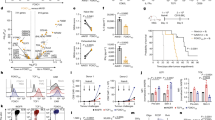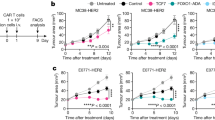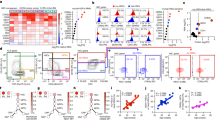Abstract
The transfer of genes encoding cytokines into tumor cells has emerged as a new strategy to increase in vivo host reactivity to a variety of tumors. Because gene transfer into tumor cells cannot be easily applied in the clinical setting, we have developed an experimental model of gene transfer into fibroblasts and examined the capacity of these engineered cells to elicit an antitumor immune response. Interleukin-12 (IL-12) is a heterodimeric cytokine with pleiotropic activities presenting strong antitumor and antimetastatic effects in murine models. A bicistronic retroviral vector was constructed that contained the cDNAs encoding both chains (p40 and p35) of murine IL-12 separated by an internal ribosomal entry site sequence. Syngeneic cutaneous fibroblasts obtained from newborn mice and transduced to secrete either IL-12 or IL-2 were injected subcutaneously with B16F0 or B16F1 melanoma cells. The time of tumor occurrence and overall survival of mice were significantly prolonged when B16F1 cells were coinjected with cytokine-producing fibroblasts compared with B16F1 alone or B16F1 together with unmanipulated fibroblasts. Systemic effects were seen in the mice injected with either IL-2- or IL-12-secreting fibroblasts, with the highest proliferation capability and interferon-γ production observed in vitro from splenocytes from recipients of IL-2-secreting fibroblasts. Injection of IL-2-secreting fibroblasts or coinjection of IL-2- and IL-12-producing fibroblasts resulted in a significant increase of survival in the B16F0 model; in some cases, complete disease eradication was observed. These results suggest that cutaneous fibroblasts represent a target of choice for gene transfer and would be useful in the treatment of minimal residual disease in humans.
This is a preview of subscription content, access via your institution
Access options
Subscribe to this journal
Receive 12 print issues and online access
$259.00 per year
only $21.58 per issue
Buy this article
- Purchase on Springer Link
- Instant access to full article PDF
Prices may be subject to local taxes which are calculated during checkout
Similar content being viewed by others
Author information
Authors and Affiliations
Rights and permissions
About this article
Cite this article
Govaerts, AS., Guillaume, T., André, M. et al. Retroviral-mediated transfer of genes encoding interleukin-2 and interleukin-12 into fibroblasts increases host antitumor responsiveness. Cancer Gene Ther 6, 447–455 (1999). https://doi.org/10.1038/sj.cgt.7700064
Received:
Accepted:
Published:
Issue Date:
DOI: https://doi.org/10.1038/sj.cgt.7700064
Keywords
This article is cited by
-
New insights into IL-12-mediated tumor suppression
Cell Death & Differentiation (2015)



